Global and International Business: Turkish Wine Industry Report
VerifiedAdded on 2020/11/13
|21
|5414
|72
Report
AI Summary
This report provides a comprehensive analysis of the Turkish wine industry, examining its competitive landscape and investment prospects. Utilizing Porter's National Diamond model, the report assesses factor conditions, demand conditions, related and supporting industries, firm strategy, structure, and rivalry, as well as the roles of government and chance. The study then delves into market entry strategies, specifically focusing on the advantages and disadvantages of Foreign Direct Investment (FDI) in Turkey, and provides a recommendation for market entry. Finally, the report addresses contemporary management issues, including corporate social responsibility and corporate governance within the context of the Turkish wine industry. The analysis considers the industry's historical background, current market trends, and potential challenges, providing a holistic view of the industry's competitiveness and future opportunities.
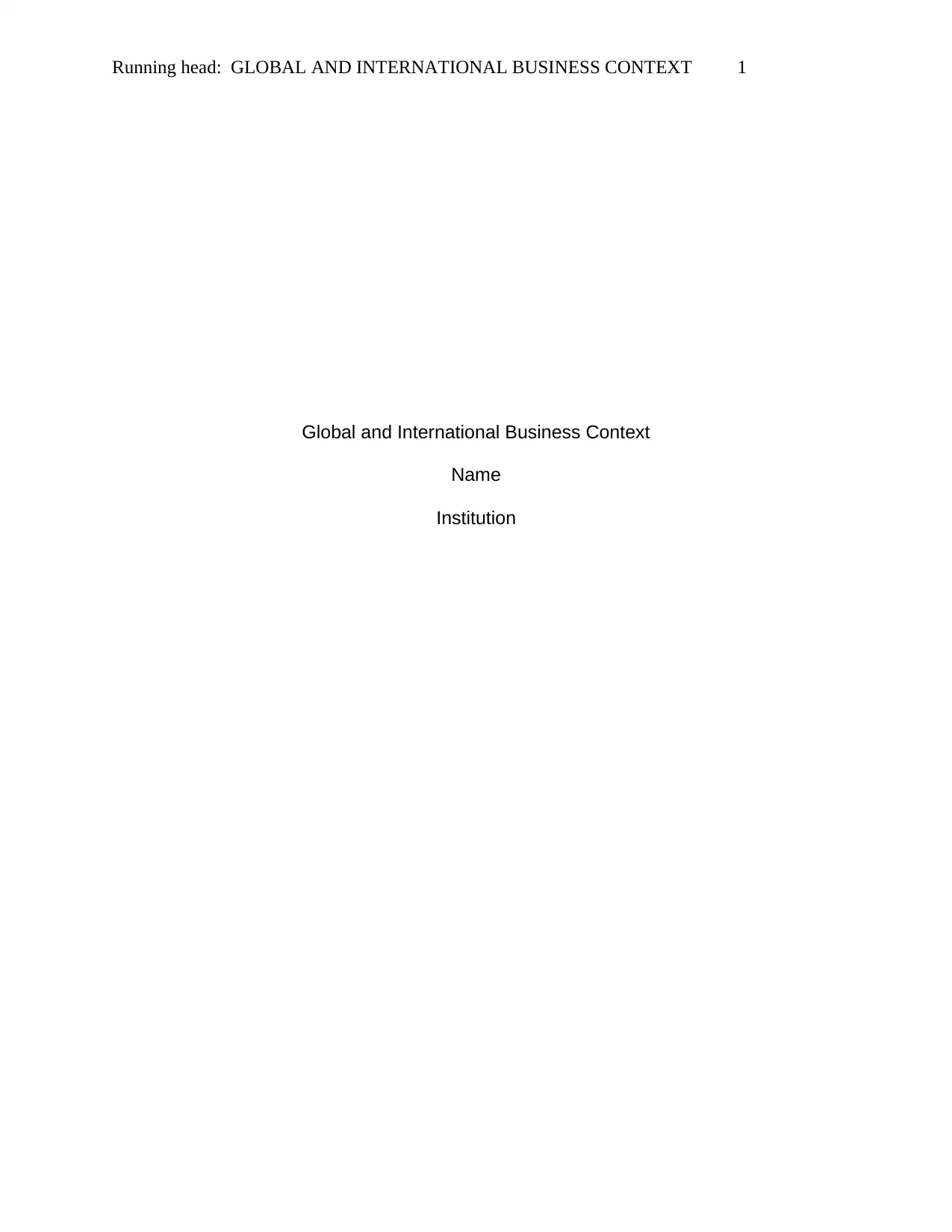
Running head: GLOBAL AND INTERNATIONAL BUSINESS CONTEXT 1
Global and International Business Context
Name
Institution
Global and International Business Context
Name
Institution
Paraphrase This Document
Need a fresh take? Get an instant paraphrase of this document with our AI Paraphraser
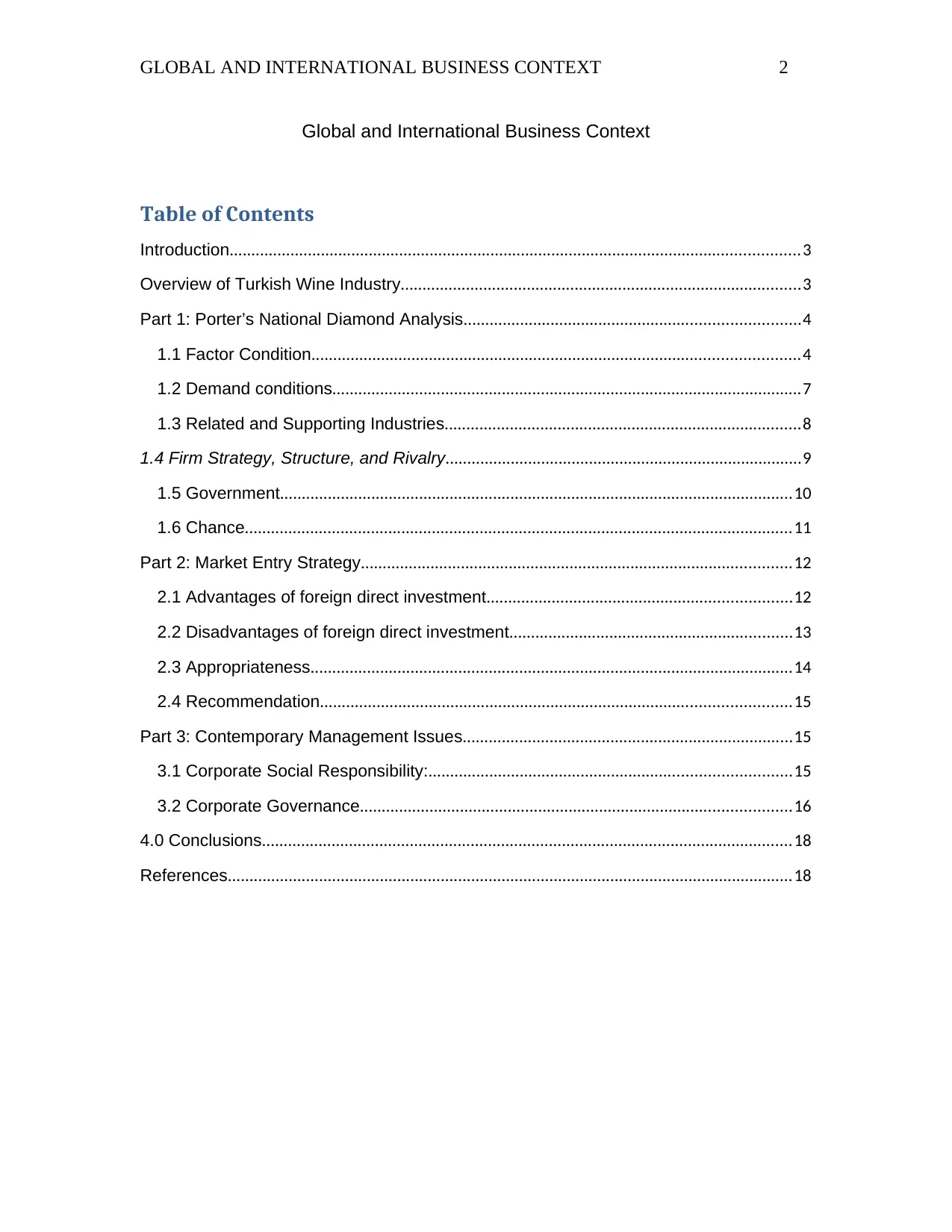
GLOBAL AND INTERNATIONAL BUSINESS CONTEXT 2
Global and International Business Context
Table of Contents
Introduction...................................................................................................................................3
Overview of Turkish Wine Industry............................................................................................3
Part 1: Porter’s National Diamond Analysis.............................................................................4
1.1 Factor Condition................................................................................................................4
1.2 Demand conditions............................................................................................................7
1.3 Related and Supporting Industries..................................................................................8
1.4 Firm Strategy, Structure, and Rivalry..................................................................................9
1.5 Government......................................................................................................................10
1.6 Chance..............................................................................................................................11
Part 2: Market Entry Strategy...................................................................................................12
2.1 Advantages of foreign direct investment......................................................................12
2.2 Disadvantages of foreign direct investment.................................................................13
2.3 Appropriateness...............................................................................................................14
2.4 Recommendation............................................................................................................15
Part 3: Contemporary Management Issues............................................................................15
3.1 Corporate Social Responsibility:...................................................................................15
3.2 Corporate Governance...................................................................................................16
4.0 Conclusions..........................................................................................................................18
References..................................................................................................................................18
Global and International Business Context
Table of Contents
Introduction...................................................................................................................................3
Overview of Turkish Wine Industry............................................................................................3
Part 1: Porter’s National Diamond Analysis.............................................................................4
1.1 Factor Condition................................................................................................................4
1.2 Demand conditions............................................................................................................7
1.3 Related and Supporting Industries..................................................................................8
1.4 Firm Strategy, Structure, and Rivalry..................................................................................9
1.5 Government......................................................................................................................10
1.6 Chance..............................................................................................................................11
Part 2: Market Entry Strategy...................................................................................................12
2.1 Advantages of foreign direct investment......................................................................12
2.2 Disadvantages of foreign direct investment.................................................................13
2.3 Appropriateness...............................................................................................................14
2.4 Recommendation............................................................................................................15
Part 3: Contemporary Management Issues............................................................................15
3.1 Corporate Social Responsibility:...................................................................................15
3.2 Corporate Governance...................................................................................................16
4.0 Conclusions..........................................................................................................................18
References..................................................................................................................................18
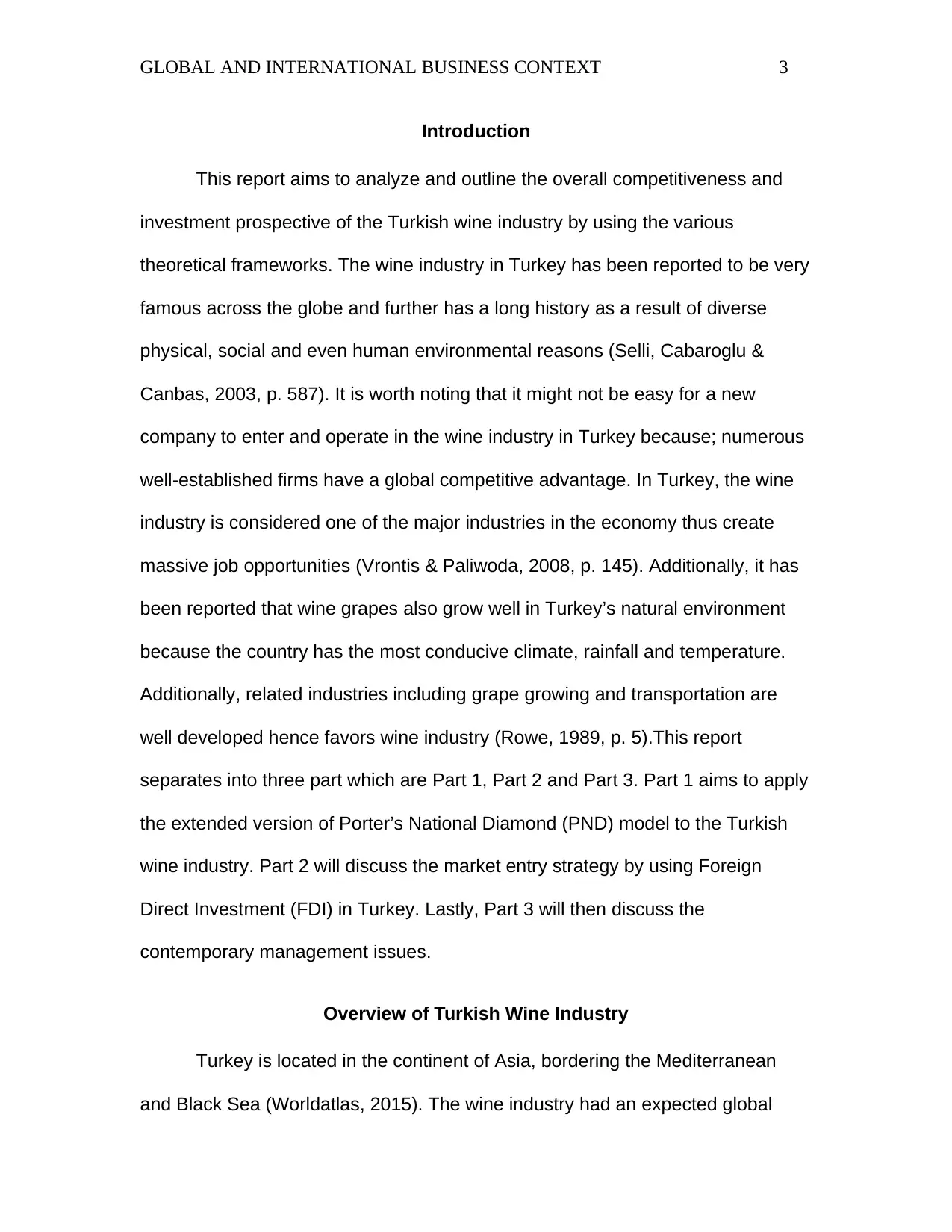
GLOBAL AND INTERNATIONAL BUSINESS CONTEXT 3
Introduction
This report aims to analyze and outline the overall competitiveness and
investment prospective of the Turkish wine industry by using the various
theoretical frameworks. The wine industry in Turkey has been reported to be very
famous across the globe and further has a long history as a result of diverse
physical, social and even human environmental reasons (Selli, Cabaroglu &
Canbas, 2003, p. 587). It is worth noting that it might not be easy for a new
company to enter and operate in the wine industry in Turkey because; numerous
well-established firms have a global competitive advantage. In Turkey, the wine
industry is considered one of the major industries in the economy thus create
massive job opportunities (Vrontis & Paliwoda, 2008, p. 145). Additionally, it has
been reported that wine grapes also grow well in Turkey’s natural environment
because the country has the most conducive climate, rainfall and temperature.
Additionally, related industries including grape growing and transportation are
well developed hence favors wine industry (Rowe, 1989, p. 5).This report
separates into three part which are Part 1, Part 2 and Part 3. Part 1 aims to apply
the extended version of Porter’s National Diamond (PND) model to the Turkish
wine industry. Part 2 will discuss the market entry strategy by using Foreign
Direct Investment (FDI) in Turkey. Lastly, Part 3 will then discuss the
contemporary management issues.
Overview of Turkish Wine Industry
Turkey is located in the continent of Asia, bordering the Mediterranean
and Black Sea (Worldatlas, 2015). The wine industry had an expected global
Introduction
This report aims to analyze and outline the overall competitiveness and
investment prospective of the Turkish wine industry by using the various
theoretical frameworks. The wine industry in Turkey has been reported to be very
famous across the globe and further has a long history as a result of diverse
physical, social and even human environmental reasons (Selli, Cabaroglu &
Canbas, 2003, p. 587). It is worth noting that it might not be easy for a new
company to enter and operate in the wine industry in Turkey because; numerous
well-established firms have a global competitive advantage. In Turkey, the wine
industry is considered one of the major industries in the economy thus create
massive job opportunities (Vrontis & Paliwoda, 2008, p. 145). Additionally, it has
been reported that wine grapes also grow well in Turkey’s natural environment
because the country has the most conducive climate, rainfall and temperature.
Additionally, related industries including grape growing and transportation are
well developed hence favors wine industry (Rowe, 1989, p. 5).This report
separates into three part which are Part 1, Part 2 and Part 3. Part 1 aims to apply
the extended version of Porter’s National Diamond (PND) model to the Turkish
wine industry. Part 2 will discuss the market entry strategy by using Foreign
Direct Investment (FDI) in Turkey. Lastly, Part 3 will then discuss the
contemporary management issues.
Overview of Turkish Wine Industry
Turkey is located in the continent of Asia, bordering the Mediterranean
and Black Sea (Worldatlas, 2015). The wine industry had an expected global
⊘ This is a preview!⊘
Do you want full access?
Subscribe today to unlock all pages.

Trusted by 1+ million students worldwide
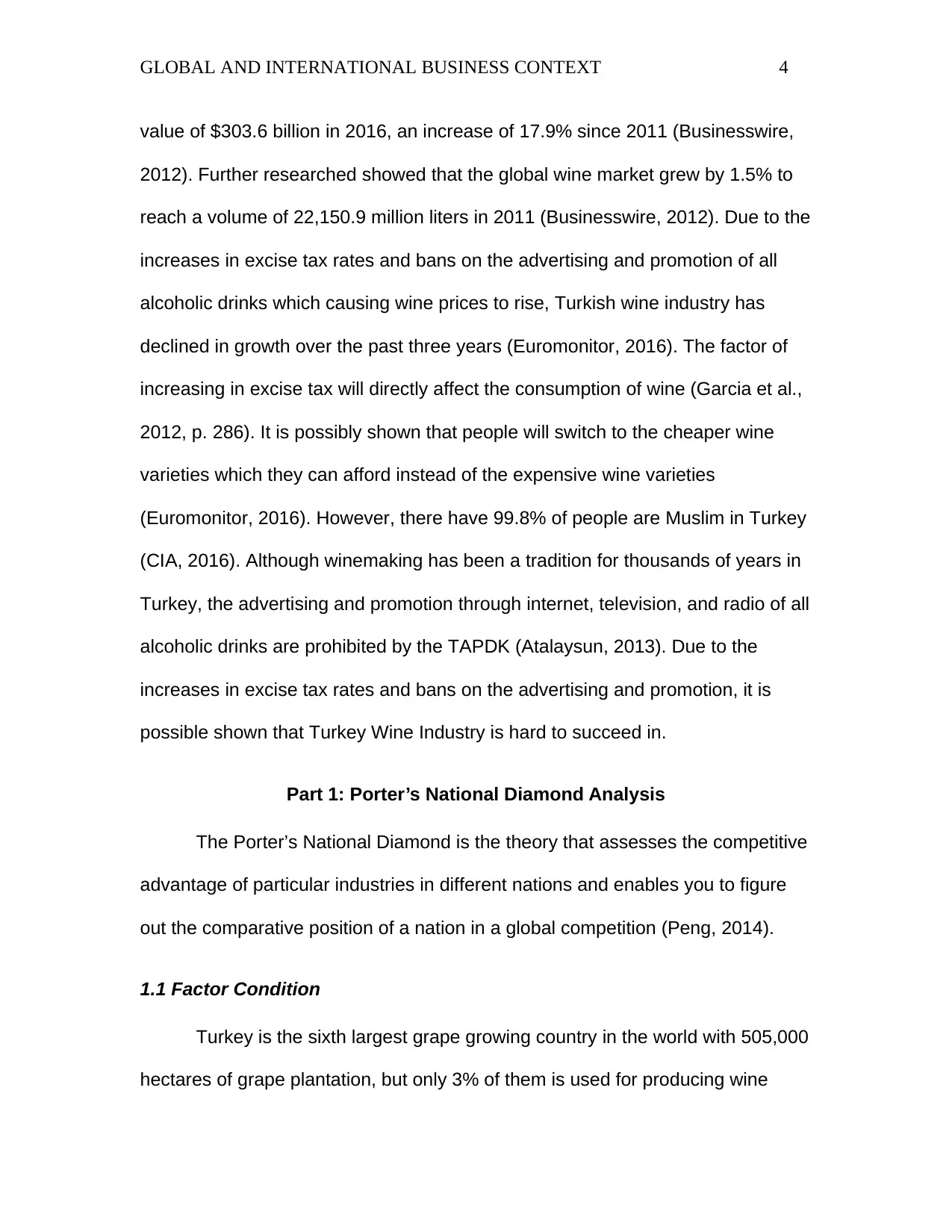
GLOBAL AND INTERNATIONAL BUSINESS CONTEXT 4
value of $303.6 billion in 2016, an increase of 17.9% since 2011 (Businesswire,
2012). Further researched showed that the global wine market grew by 1.5% to
reach a volume of 22,150.9 million liters in 2011 (Businesswire, 2012). Due to the
increases in excise tax rates and bans on the advertising and promotion of all
alcoholic drinks which causing wine prices to rise, Turkish wine industry has
declined in growth over the past three years (Euromonitor, 2016). The factor of
increasing in excise tax will directly affect the consumption of wine (Garcia et al.,
2012, p. 286). It is possibly shown that people will switch to the cheaper wine
varieties which they can afford instead of the expensive wine varieties
(Euromonitor, 2016). However, there have 99.8% of people are Muslim in Turkey
(CIA, 2016). Although winemaking has been a tradition for thousands of years in
Turkey, the advertising and promotion through internet, television, and radio of all
alcoholic drinks are prohibited by the TAPDK (Atalaysun, 2013). Due to the
increases in excise tax rates and bans on the advertising and promotion, it is
possible shown that Turkey Wine Industry is hard to succeed in.
Part 1: Porter’s National Diamond Analysis
The Porter’s National Diamond is the theory that assesses the competitive
advantage of particular industries in different nations and enables you to figure
out the comparative position of a nation in a global competition (Peng, 2014).
1.1 Factor Condition
Turkey is the sixth largest grape growing country in the world with 505,000
hectares of grape plantation, but only 3% of them is used for producing wine
value of $303.6 billion in 2016, an increase of 17.9% since 2011 (Businesswire,
2012). Further researched showed that the global wine market grew by 1.5% to
reach a volume of 22,150.9 million liters in 2011 (Businesswire, 2012). Due to the
increases in excise tax rates and bans on the advertising and promotion of all
alcoholic drinks which causing wine prices to rise, Turkish wine industry has
declined in growth over the past three years (Euromonitor, 2016). The factor of
increasing in excise tax will directly affect the consumption of wine (Garcia et al.,
2012, p. 286). It is possibly shown that people will switch to the cheaper wine
varieties which they can afford instead of the expensive wine varieties
(Euromonitor, 2016). However, there have 99.8% of people are Muslim in Turkey
(CIA, 2016). Although winemaking has been a tradition for thousands of years in
Turkey, the advertising and promotion through internet, television, and radio of all
alcoholic drinks are prohibited by the TAPDK (Atalaysun, 2013). Due to the
increases in excise tax rates and bans on the advertising and promotion, it is
possible shown that Turkey Wine Industry is hard to succeed in.
Part 1: Porter’s National Diamond Analysis
The Porter’s National Diamond is the theory that assesses the competitive
advantage of particular industries in different nations and enables you to figure
out the comparative position of a nation in a global competition (Peng, 2014).
1.1 Factor Condition
Turkey is the sixth largest grape growing country in the world with 505,000
hectares of grape plantation, but only 3% of them is used for producing wine
Paraphrase This Document
Need a fresh take? Get an instant paraphrase of this document with our AI Paraphraser
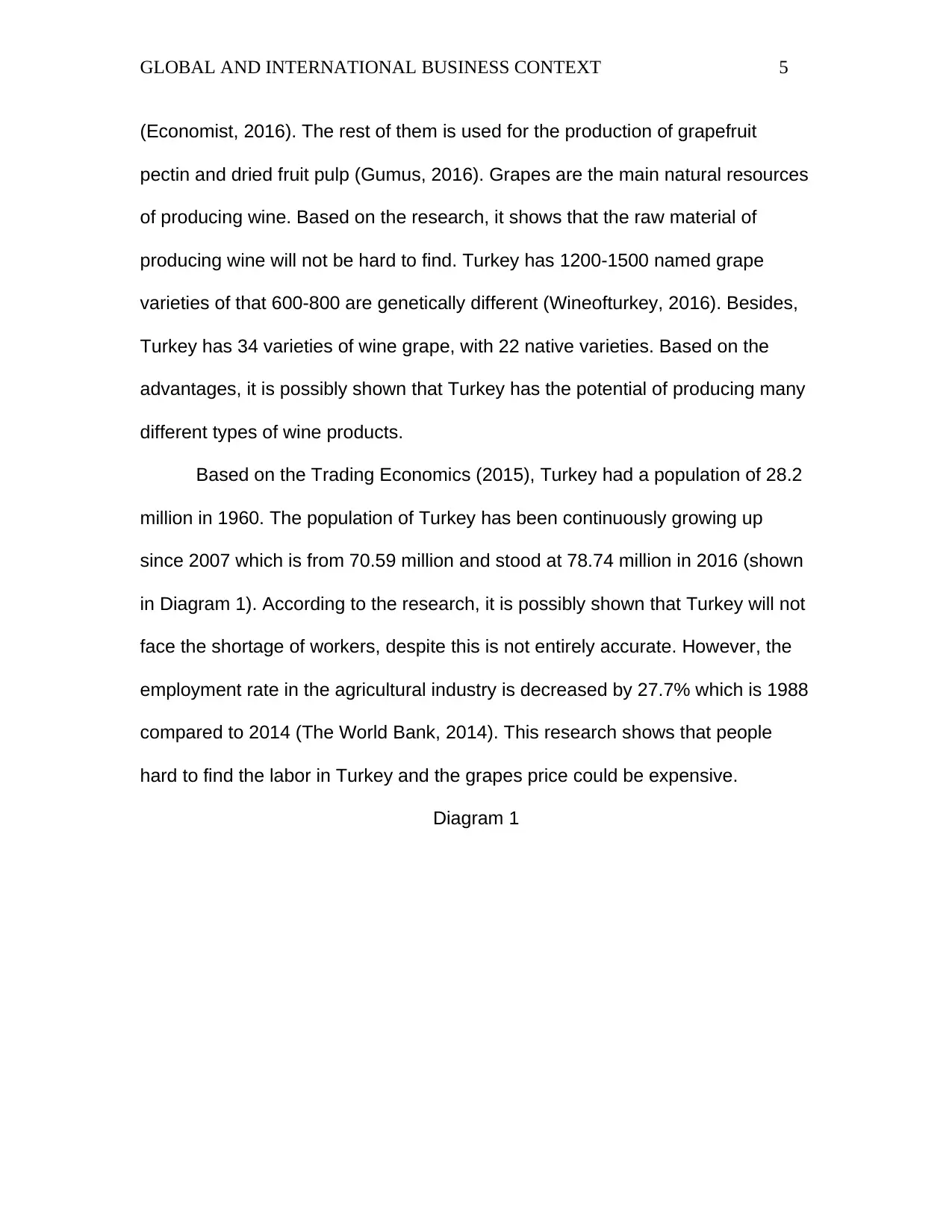
GLOBAL AND INTERNATIONAL BUSINESS CONTEXT 5
(Economist, 2016). The rest of them is used for the production of grapefruit
pectin and dried fruit pulp (Gumus, 2016). Grapes are the main natural resources
of producing wine. Based on the research, it shows that the raw material of
producing wine will not be hard to find. Turkey has 1200-1500 named grape
varieties of that 600-800 are genetically different (Wineofturkey, 2016). Besides,
Turkey has 34 varieties of wine grape, with 22 native varieties. Based on the
advantages, it is possibly shown that Turkey has the potential of producing many
different types of wine products.
Based on the Trading Economics (2015), Turkey had a population of 28.2
million in 1960. The population of Turkey has been continuously growing up
since 2007 which is from 70.59 million and stood at 78.74 million in 2016 (shown
in Diagram 1). According to the research, it is possibly shown that Turkey will not
face the shortage of workers, despite this is not entirely accurate. However, the
employment rate in the agricultural industry is decreased by 27.7% which is 1988
compared to 2014 (The World Bank, 2014). This research shows that people
hard to find the labor in Turkey and the grapes price could be expensive.
Diagram 1
(Economist, 2016). The rest of them is used for the production of grapefruit
pectin and dried fruit pulp (Gumus, 2016). Grapes are the main natural resources
of producing wine. Based on the research, it shows that the raw material of
producing wine will not be hard to find. Turkey has 1200-1500 named grape
varieties of that 600-800 are genetically different (Wineofturkey, 2016). Besides,
Turkey has 34 varieties of wine grape, with 22 native varieties. Based on the
advantages, it is possibly shown that Turkey has the potential of producing many
different types of wine products.
Based on the Trading Economics (2015), Turkey had a population of 28.2
million in 1960. The population of Turkey has been continuously growing up
since 2007 which is from 70.59 million and stood at 78.74 million in 2016 (shown
in Diagram 1). According to the research, it is possibly shown that Turkey will not
face the shortage of workers, despite this is not entirely accurate. However, the
employment rate in the agricultural industry is decreased by 27.7% which is 1988
compared to 2014 (The World Bank, 2014). This research shows that people
hard to find the labor in Turkey and the grapes price could be expensive.
Diagram 1
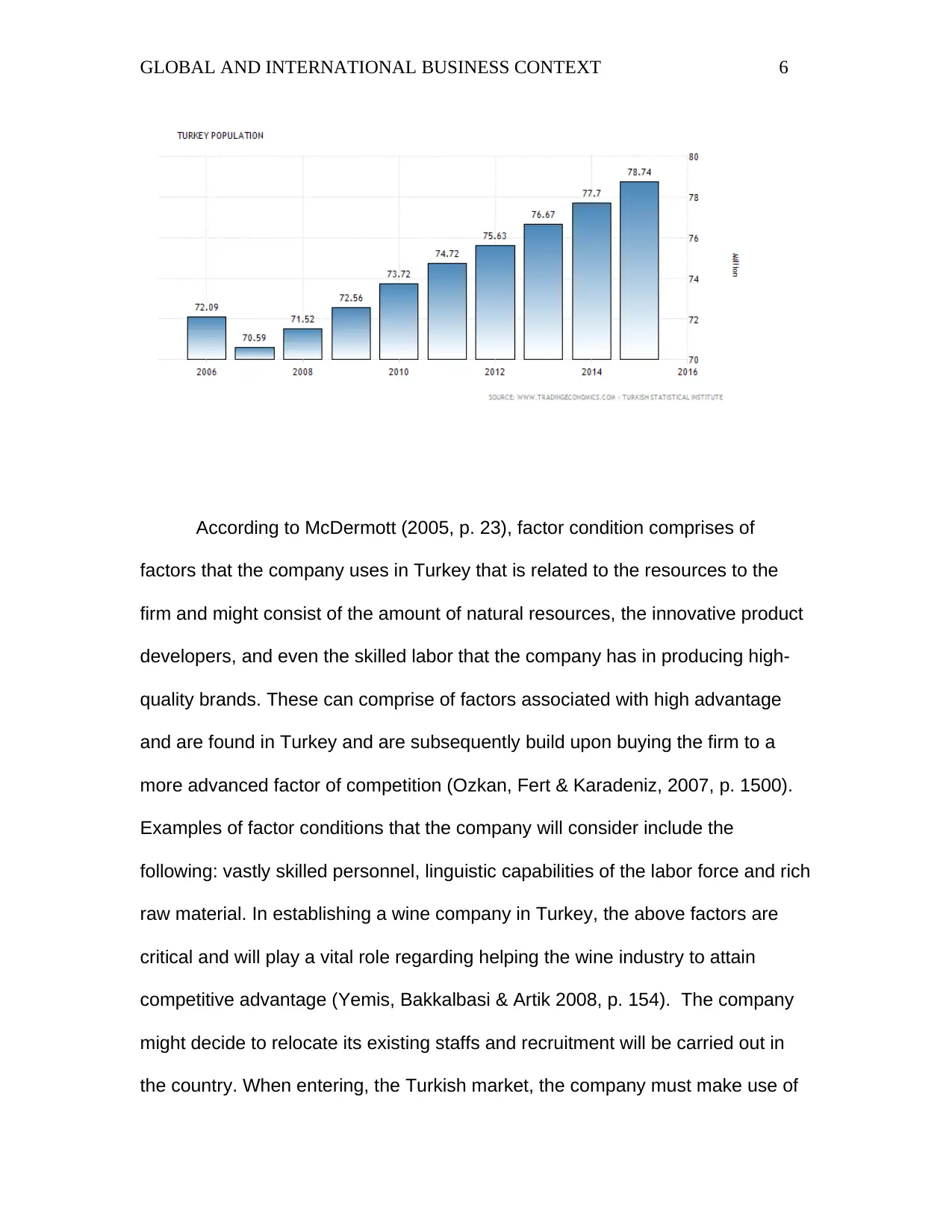
GLOBAL AND INTERNATIONAL BUSINESS CONTEXT 6
According to McDermott (2005, p. 23), factor condition comprises of
factors that the company uses in Turkey that is related to the resources to the
firm and might consist of the amount of natural resources, the innovative product
developers, and even the skilled labor that the company has in producing high-
quality brands. These can comprise of factors associated with high advantage
and are found in Turkey and are subsequently build upon buying the firm to a
more advanced factor of competition (Ozkan, Fert & Karadeniz, 2007, p. 1500).
Examples of factor conditions that the company will consider include the
following: vastly skilled personnel, linguistic capabilities of the labor force and rich
raw material. In establishing a wine company in Turkey, the above factors are
critical and will play a vital role regarding helping the wine industry to attain
competitive advantage (Yemis, Bakkalbasi & Artik 2008, p. 154). The company
might decide to relocate its existing staffs and recruitment will be carried out in
the country. When entering, the Turkish market, the company must make use of
According to McDermott (2005, p. 23), factor condition comprises of
factors that the company uses in Turkey that is related to the resources to the
firm and might consist of the amount of natural resources, the innovative product
developers, and even the skilled labor that the company has in producing high-
quality brands. These can comprise of factors associated with high advantage
and are found in Turkey and are subsequently build upon buying the firm to a
more advanced factor of competition (Ozkan, Fert & Karadeniz, 2007, p. 1500).
Examples of factor conditions that the company will consider include the
following: vastly skilled personnel, linguistic capabilities of the labor force and rich
raw material. In establishing a wine company in Turkey, the above factors are
critical and will play a vital role regarding helping the wine industry to attain
competitive advantage (Yemis, Bakkalbasi & Artik 2008, p. 154). The company
might decide to relocate its existing staffs and recruitment will be carried out in
the country. When entering, the Turkish market, the company must make use of
⊘ This is a preview!⊘
Do you want full access?
Subscribe today to unlock all pages.

Trusted by 1+ million students worldwide
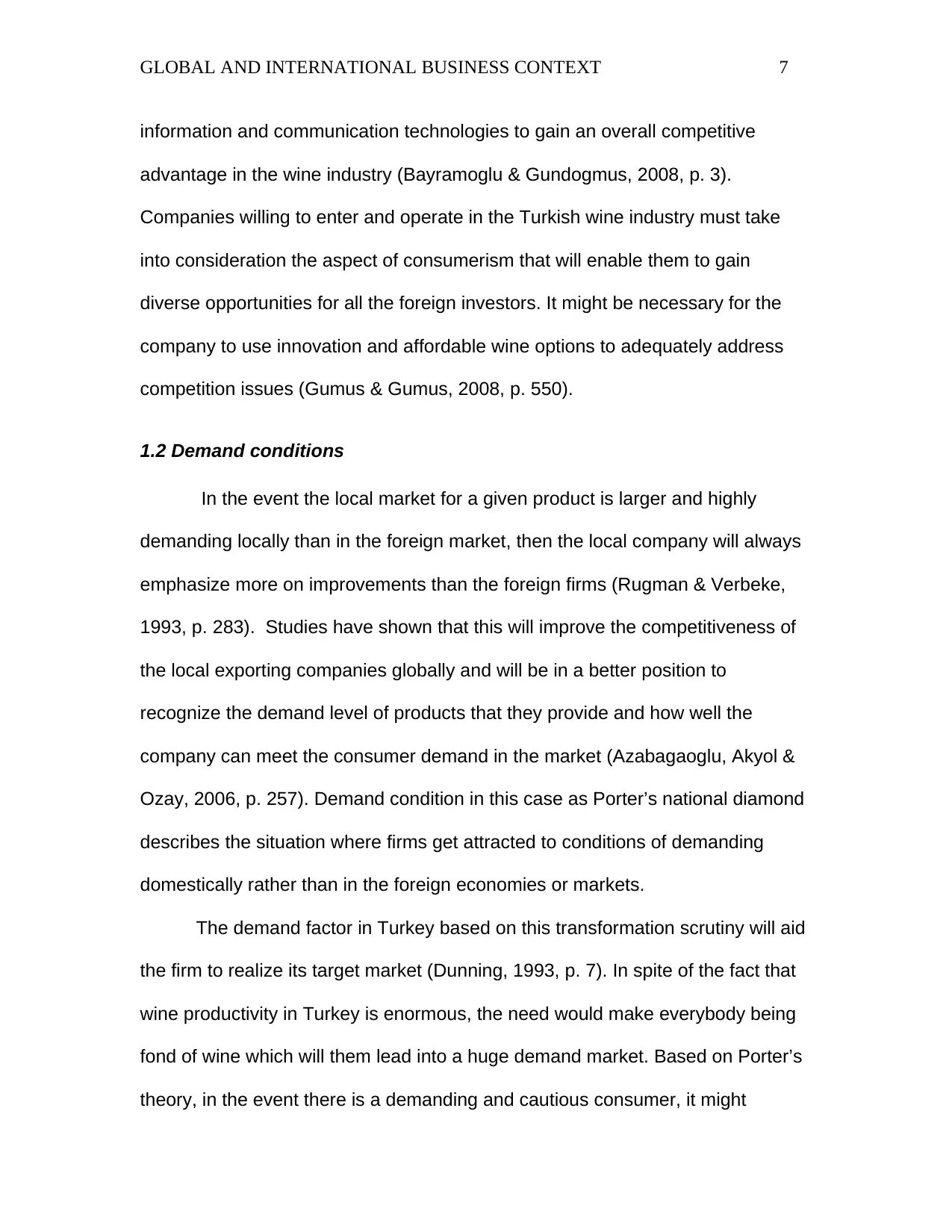
GLOBAL AND INTERNATIONAL BUSINESS CONTEXT 7
information and communication technologies to gain an overall competitive
advantage in the wine industry (Bayramoglu & Gundogmus, 2008, p. 3).
Companies willing to enter and operate in the Turkish wine industry must take
into consideration the aspect of consumerism that will enable them to gain
diverse opportunities for all the foreign investors. It might be necessary for the
company to use innovation and affordable wine options to adequately address
competition issues (Gumus & Gumus, 2008, p. 550).
1.2 Demand conditions
In the event the local market for a given product is larger and highly
demanding locally than in the foreign market, then the local company will always
emphasize more on improvements than the foreign firms (Rugman & Verbeke,
1993, p. 283). Studies have shown that this will improve the competitiveness of
the local exporting companies globally and will be in a better position to
recognize the demand level of products that they provide and how well the
company can meet the consumer demand in the market (Azabagaoglu, Akyol &
Ozay, 2006, p. 257). Demand condition in this case as Porter’s national diamond
describes the situation where firms get attracted to conditions of demanding
domestically rather than in the foreign economies or markets.
The demand factor in Turkey based on this transformation scrutiny will aid
the firm to realize its target market (Dunning, 1993, p. 7). In spite of the fact that
wine productivity in Turkey is enormous, the need would make everybody being
fond of wine which will them lead into a huge demand market. Based on Porter’s
theory, in the event there is a demanding and cautious consumer, it might
information and communication technologies to gain an overall competitive
advantage in the wine industry (Bayramoglu & Gundogmus, 2008, p. 3).
Companies willing to enter and operate in the Turkish wine industry must take
into consideration the aspect of consumerism that will enable them to gain
diverse opportunities for all the foreign investors. It might be necessary for the
company to use innovation and affordable wine options to adequately address
competition issues (Gumus & Gumus, 2008, p. 550).
1.2 Demand conditions
In the event the local market for a given product is larger and highly
demanding locally than in the foreign market, then the local company will always
emphasize more on improvements than the foreign firms (Rugman & Verbeke,
1993, p. 283). Studies have shown that this will improve the competitiveness of
the local exporting companies globally and will be in a better position to
recognize the demand level of products that they provide and how well the
company can meet the consumer demand in the market (Azabagaoglu, Akyol &
Ozay, 2006, p. 257). Demand condition in this case as Porter’s national diamond
describes the situation where firms get attracted to conditions of demanding
domestically rather than in the foreign economies or markets.
The demand factor in Turkey based on this transformation scrutiny will aid
the firm to realize its target market (Dunning, 1993, p. 7). In spite of the fact that
wine productivity in Turkey is enormous, the need would make everybody being
fond of wine which will them lead into a huge demand market. Based on Porter’s
theory, in the event there is a demanding and cautious consumer, it might
Paraphrase This Document
Need a fresh take? Get an instant paraphrase of this document with our AI Paraphraser
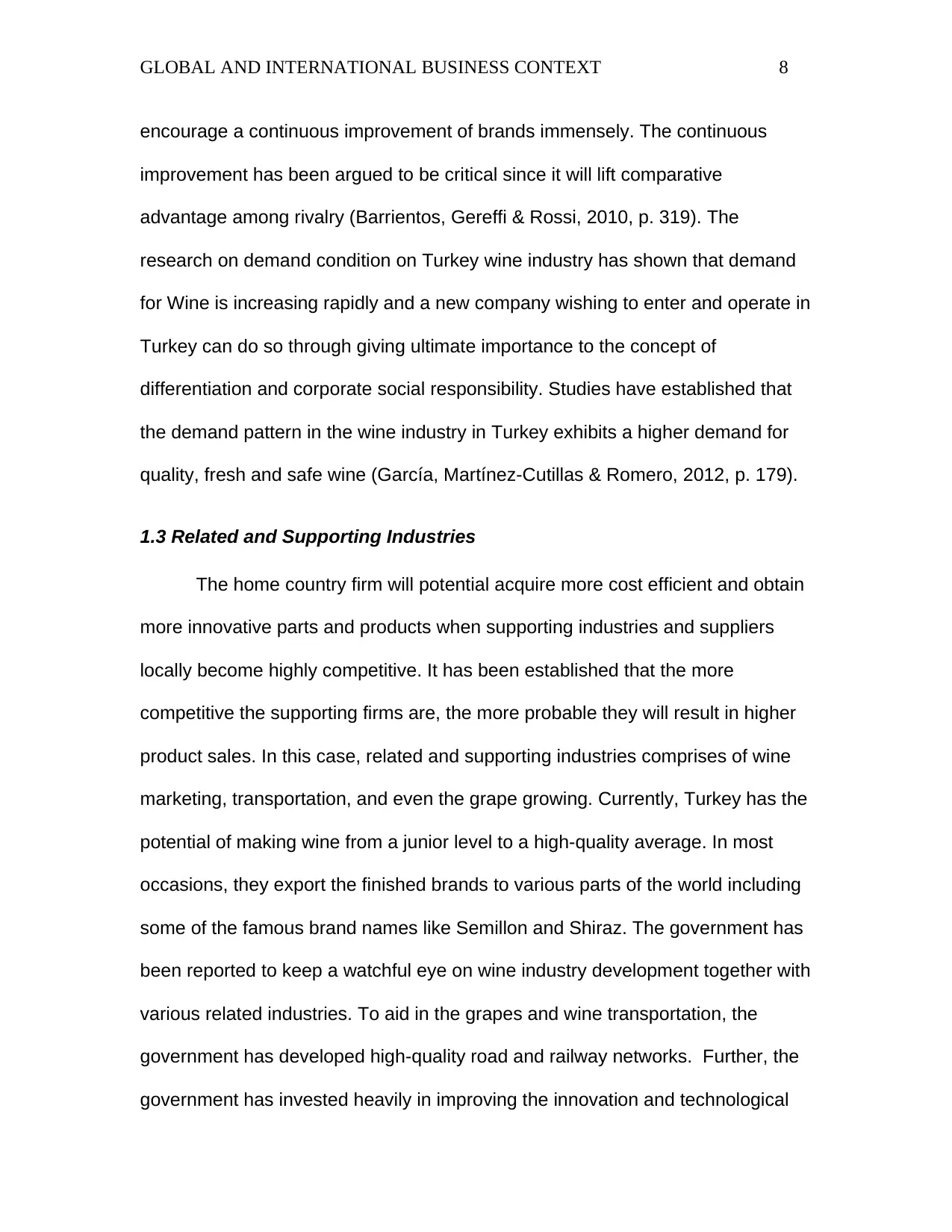
GLOBAL AND INTERNATIONAL BUSINESS CONTEXT 8
encourage a continuous improvement of brands immensely. The continuous
improvement has been argued to be critical since it will lift comparative
advantage among rivalry (Barrientos, Gereffi & Rossi, 2010, p. 319). The
research on demand condition on Turkey wine industry has shown that demand
for Wine is increasing rapidly and a new company wishing to enter and operate in
Turkey can do so through giving ultimate importance to the concept of
differentiation and corporate social responsibility. Studies have established that
the demand pattern in the wine industry in Turkey exhibits a higher demand for
quality, fresh and safe wine (García, Martínez-Cutillas & Romero, 2012, p. 179).
1.3 Related and Supporting Industries
The home country firm will potential acquire more cost efficient and obtain
more innovative parts and products when supporting industries and suppliers
locally become highly competitive. It has been established that the more
competitive the supporting firms are, the more probable they will result in higher
product sales. In this case, related and supporting industries comprises of wine
marketing, transportation, and even the grape growing. Currently, Turkey has the
potential of making wine from a junior level to a high-quality average. In most
occasions, they export the finished brands to various parts of the world including
some of the famous brand names like Semillon and Shiraz. The government has
been reported to keep a watchful eye on wine industry development together with
various related industries. To aid in the grapes and wine transportation, the
government has developed high-quality road and railway networks. Further, the
government has invested heavily in improving the innovation and technological
encourage a continuous improvement of brands immensely. The continuous
improvement has been argued to be critical since it will lift comparative
advantage among rivalry (Barrientos, Gereffi & Rossi, 2010, p. 319). The
research on demand condition on Turkey wine industry has shown that demand
for Wine is increasing rapidly and a new company wishing to enter and operate in
Turkey can do so through giving ultimate importance to the concept of
differentiation and corporate social responsibility. Studies have established that
the demand pattern in the wine industry in Turkey exhibits a higher demand for
quality, fresh and safe wine (García, Martínez-Cutillas & Romero, 2012, p. 179).
1.3 Related and Supporting Industries
The home country firm will potential acquire more cost efficient and obtain
more innovative parts and products when supporting industries and suppliers
locally become highly competitive. It has been established that the more
competitive the supporting firms are, the more probable they will result in higher
product sales. In this case, related and supporting industries comprises of wine
marketing, transportation, and even the grape growing. Currently, Turkey has the
potential of making wine from a junior level to a high-quality average. In most
occasions, they export the finished brands to various parts of the world including
some of the famous brand names like Semillon and Shiraz. The government has
been reported to keep a watchful eye on wine industry development together with
various related industries. To aid in the grapes and wine transportation, the
government has developed high-quality road and railway networks. Further, the
government has invested heavily in improving the innovation and technological
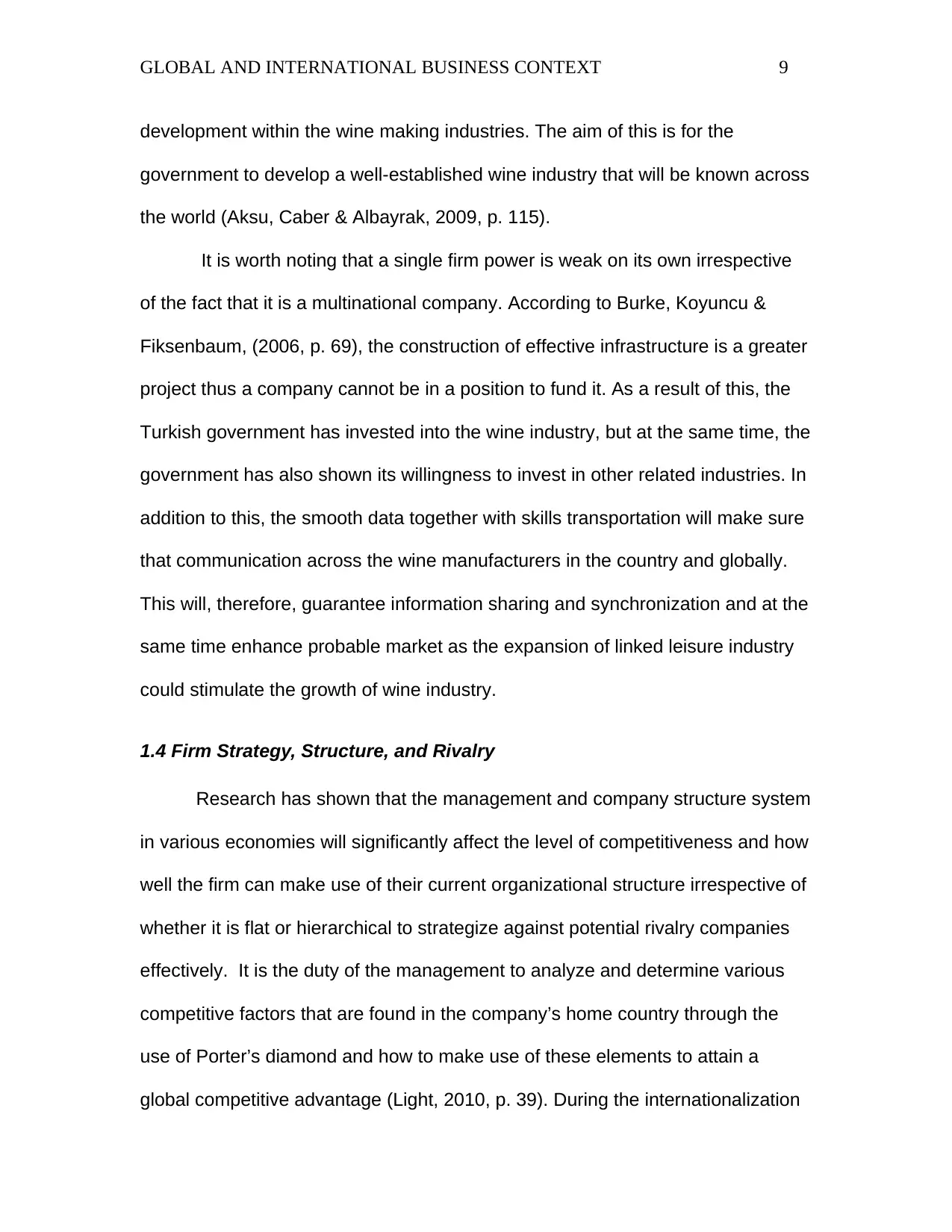
GLOBAL AND INTERNATIONAL BUSINESS CONTEXT 9
development within the wine making industries. The aim of this is for the
government to develop a well-established wine industry that will be known across
the world (Aksu, Caber & Albayrak, 2009, p. 115).
It is worth noting that a single firm power is weak on its own irrespective
of the fact that it is a multinational company. According to Burke, Koyuncu &
Fiksenbaum, (2006, p. 69), the construction of effective infrastructure is a greater
project thus a company cannot be in a position to fund it. As a result of this, the
Turkish government has invested into the wine industry, but at the same time, the
government has also shown its willingness to invest in other related industries. In
addition to this, the smooth data together with skills transportation will make sure
that communication across the wine manufacturers in the country and globally.
This will, therefore, guarantee information sharing and synchronization and at the
same time enhance probable market as the expansion of linked leisure industry
could stimulate the growth of wine industry.
1.4 Firm Strategy, Structure, and Rivalry
Research has shown that the management and company structure system
in various economies will significantly affect the level of competitiveness and how
well the firm can make use of their current organizational structure irrespective of
whether it is flat or hierarchical to strategize against potential rivalry companies
effectively. It is the duty of the management to analyze and determine various
competitive factors that are found in the company’s home country through the
use of Porter’s diamond and how to make use of these elements to attain a
global competitive advantage (Light, 2010, p. 39). During the internationalization
development within the wine making industries. The aim of this is for the
government to develop a well-established wine industry that will be known across
the world (Aksu, Caber & Albayrak, 2009, p. 115).
It is worth noting that a single firm power is weak on its own irrespective
of the fact that it is a multinational company. According to Burke, Koyuncu &
Fiksenbaum, (2006, p. 69), the construction of effective infrastructure is a greater
project thus a company cannot be in a position to fund it. As a result of this, the
Turkish government has invested into the wine industry, but at the same time, the
government has also shown its willingness to invest in other related industries. In
addition to this, the smooth data together with skills transportation will make sure
that communication across the wine manufacturers in the country and globally.
This will, therefore, guarantee information sharing and synchronization and at the
same time enhance probable market as the expansion of linked leisure industry
could stimulate the growth of wine industry.
1.4 Firm Strategy, Structure, and Rivalry
Research has shown that the management and company structure system
in various economies will significantly affect the level of competitiveness and how
well the firm can make use of their current organizational structure irrespective of
whether it is flat or hierarchical to strategize against potential rivalry companies
effectively. It is the duty of the management to analyze and determine various
competitive factors that are found in the company’s home country through the
use of Porter’s diamond and how to make use of these elements to attain a
global competitive advantage (Light, 2010, p. 39). During the internationalization
⊘ This is a preview!⊘
Do you want full access?
Subscribe today to unlock all pages.

Trusted by 1+ million students worldwide
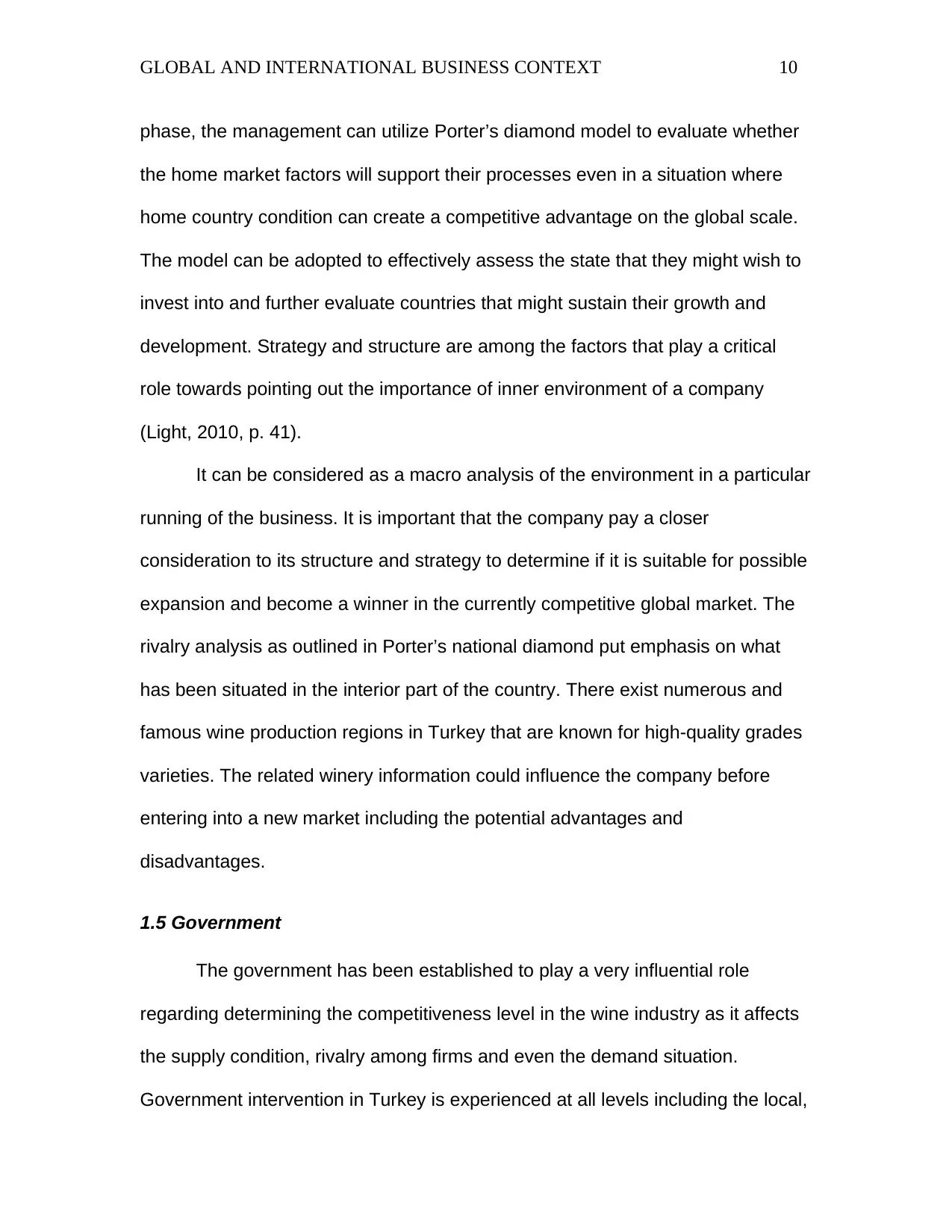
GLOBAL AND INTERNATIONAL BUSINESS CONTEXT 10
phase, the management can utilize Porter’s diamond model to evaluate whether
the home market factors will support their processes even in a situation where
home country condition can create a competitive advantage on the global scale.
The model can be adopted to effectively assess the state that they might wish to
invest into and further evaluate countries that might sustain their growth and
development. Strategy and structure are among the factors that play a critical
role towards pointing out the importance of inner environment of a company
(Light, 2010, p. 41).
It can be considered as a macro analysis of the environment in a particular
running of the business. It is important that the company pay a closer
consideration to its structure and strategy to determine if it is suitable for possible
expansion and become a winner in the currently competitive global market. The
rivalry analysis as outlined in Porter’s national diamond put emphasis on what
has been situated in the interior part of the country. There exist numerous and
famous wine production regions in Turkey that are known for high-quality grades
varieties. The related winery information could influence the company before
entering into a new market including the potential advantages and
disadvantages.
1.5 Government
The government has been established to play a very influential role
regarding determining the competitiveness level in the wine industry as it affects
the supply condition, rivalry among firms and even the demand situation.
Government intervention in Turkey is experienced at all levels including the local,
phase, the management can utilize Porter’s diamond model to evaluate whether
the home market factors will support their processes even in a situation where
home country condition can create a competitive advantage on the global scale.
The model can be adopted to effectively assess the state that they might wish to
invest into and further evaluate countries that might sustain their growth and
development. Strategy and structure are among the factors that play a critical
role towards pointing out the importance of inner environment of a company
(Light, 2010, p. 41).
It can be considered as a macro analysis of the environment in a particular
running of the business. It is important that the company pay a closer
consideration to its structure and strategy to determine if it is suitable for possible
expansion and become a winner in the currently competitive global market. The
rivalry analysis as outlined in Porter’s national diamond put emphasis on what
has been situated in the interior part of the country. There exist numerous and
famous wine production regions in Turkey that are known for high-quality grades
varieties. The related winery information could influence the company before
entering into a new market including the potential advantages and
disadvantages.
1.5 Government
The government has been established to play a very influential role
regarding determining the competitiveness level in the wine industry as it affects
the supply condition, rivalry among firms and even the demand situation.
Government intervention in Turkey is experienced at all levels including the local,
Paraphrase This Document
Need a fresh take? Get an instant paraphrase of this document with our AI Paraphraser
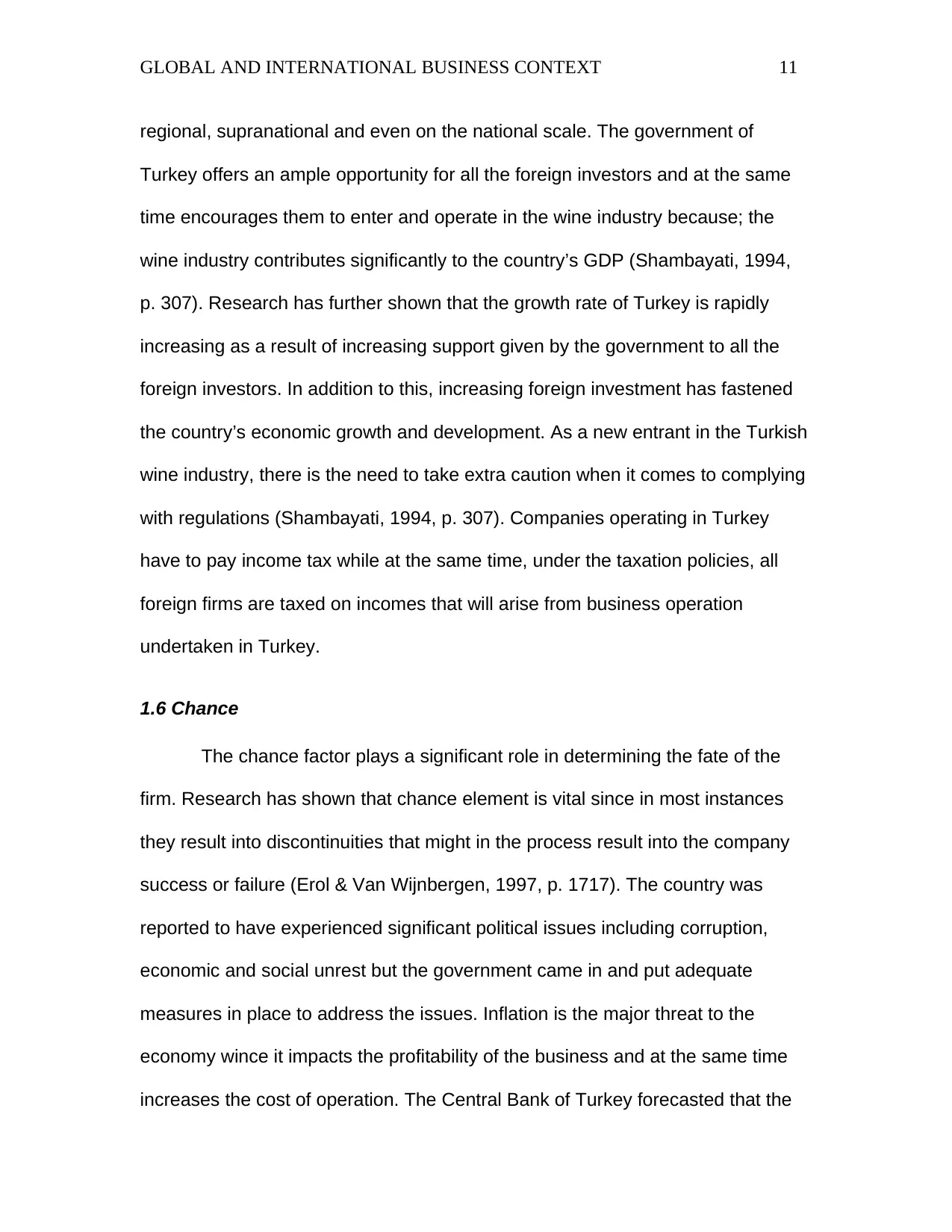
GLOBAL AND INTERNATIONAL BUSINESS CONTEXT 11
regional, supranational and even on the national scale. The government of
Turkey offers an ample opportunity for all the foreign investors and at the same
time encourages them to enter and operate in the wine industry because; the
wine industry contributes significantly to the country’s GDP (Shambayati, 1994,
p. 307). Research has further shown that the growth rate of Turkey is rapidly
increasing as a result of increasing support given by the government to all the
foreign investors. In addition to this, increasing foreign investment has fastened
the country’s economic growth and development. As a new entrant in the Turkish
wine industry, there is the need to take extra caution when it comes to complying
with regulations (Shambayati, 1994, p. 307). Companies operating in Turkey
have to pay income tax while at the same time, under the taxation policies, all
foreign firms are taxed on incomes that will arise from business operation
undertaken in Turkey.
1.6 Chance
The chance factor plays a significant role in determining the fate of the
firm. Research has shown that chance element is vital since in most instances
they result into discontinuities that might in the process result into the company
success or failure (Erol & Van Wijnbergen, 1997, p. 1717). The country was
reported to have experienced significant political issues including corruption,
economic and social unrest but the government came in and put adequate
measures in place to address the issues. Inflation is the major threat to the
economy wince it impacts the profitability of the business and at the same time
increases the cost of operation. The Central Bank of Turkey forecasted that the
regional, supranational and even on the national scale. The government of
Turkey offers an ample opportunity for all the foreign investors and at the same
time encourages them to enter and operate in the wine industry because; the
wine industry contributes significantly to the country’s GDP (Shambayati, 1994,
p. 307). Research has further shown that the growth rate of Turkey is rapidly
increasing as a result of increasing support given by the government to all the
foreign investors. In addition to this, increasing foreign investment has fastened
the country’s economic growth and development. As a new entrant in the Turkish
wine industry, there is the need to take extra caution when it comes to complying
with regulations (Shambayati, 1994, p. 307). Companies operating in Turkey
have to pay income tax while at the same time, under the taxation policies, all
foreign firms are taxed on incomes that will arise from business operation
undertaken in Turkey.
1.6 Chance
The chance factor plays a significant role in determining the fate of the
firm. Research has shown that chance element is vital since in most instances
they result into discontinuities that might in the process result into the company
success or failure (Erol & Van Wijnbergen, 1997, p. 1717). The country was
reported to have experienced significant political issues including corruption,
economic and social unrest but the government came in and put adequate
measures in place to address the issues. Inflation is the major threat to the
economy wince it impacts the profitability of the business and at the same time
increases the cost of operation. The Central Bank of Turkey forecasted that the
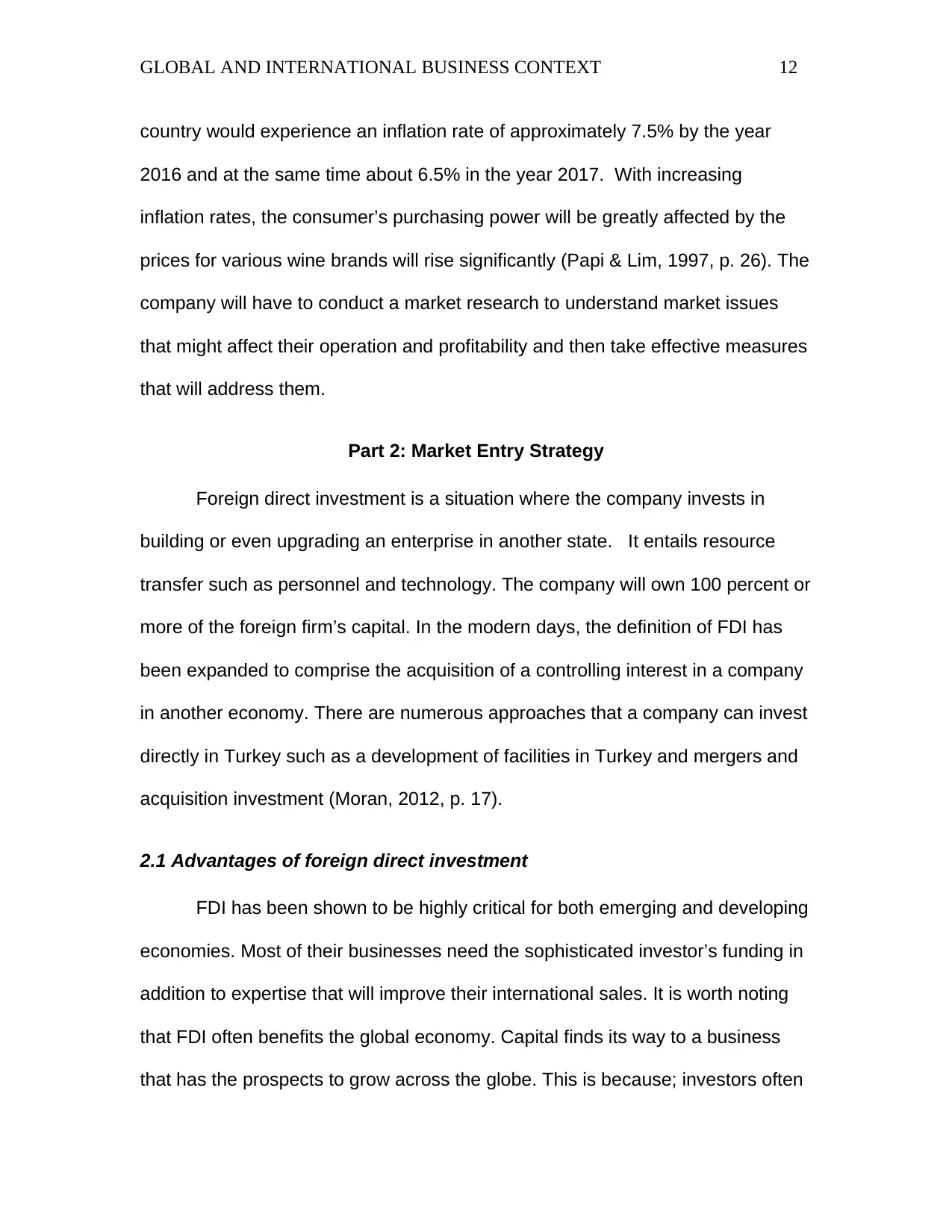
GLOBAL AND INTERNATIONAL BUSINESS CONTEXT 12
country would experience an inflation rate of approximately 7.5% by the year
2016 and at the same time about 6.5% in the year 2017. With increasing
inflation rates, the consumer’s purchasing power will be greatly affected by the
prices for various wine brands will rise significantly (Papi & Lim, 1997, p. 26). The
company will have to conduct a market research to understand market issues
that might affect their operation and profitability and then take effective measures
that will address them.
Part 2: Market Entry Strategy
Foreign direct investment is a situation where the company invests in
building or even upgrading an enterprise in another state. It entails resource
transfer such as personnel and technology. The company will own 100 percent or
more of the foreign firm’s capital. In the modern days, the definition of FDI has
been expanded to comprise the acquisition of a controlling interest in a company
in another economy. There are numerous approaches that a company can invest
directly in Turkey such as a development of facilities in Turkey and mergers and
acquisition investment (Moran, 2012, p. 17).
2.1 Advantages of foreign direct investment
FDI has been shown to be highly critical for both emerging and developing
economies. Most of their businesses need the sophisticated investor’s funding in
addition to expertise that will improve their international sales. It is worth noting
that FDI often benefits the global economy. Capital finds its way to a business
that has the prospects to grow across the globe. This is because; investors often
country would experience an inflation rate of approximately 7.5% by the year
2016 and at the same time about 6.5% in the year 2017. With increasing
inflation rates, the consumer’s purchasing power will be greatly affected by the
prices for various wine brands will rise significantly (Papi & Lim, 1997, p. 26). The
company will have to conduct a market research to understand market issues
that might affect their operation and profitability and then take effective measures
that will address them.
Part 2: Market Entry Strategy
Foreign direct investment is a situation where the company invests in
building or even upgrading an enterprise in another state. It entails resource
transfer such as personnel and technology. The company will own 100 percent or
more of the foreign firm’s capital. In the modern days, the definition of FDI has
been expanded to comprise the acquisition of a controlling interest in a company
in another economy. There are numerous approaches that a company can invest
directly in Turkey such as a development of facilities in Turkey and mergers and
acquisition investment (Moran, 2012, p. 17).
2.1 Advantages of foreign direct investment
FDI has been shown to be highly critical for both emerging and developing
economies. Most of their businesses need the sophisticated investor’s funding in
addition to expertise that will improve their international sales. It is worth noting
that FDI often benefits the global economy. Capital finds its way to a business
that has the prospects to grow across the globe. This is because; investors often
⊘ This is a preview!⊘
Do you want full access?
Subscribe today to unlock all pages.

Trusted by 1+ million students worldwide
1 out of 21
Related Documents
Your All-in-One AI-Powered Toolkit for Academic Success.
+13062052269
info@desklib.com
Available 24*7 on WhatsApp / Email
![[object Object]](/_next/static/media/star-bottom.7253800d.svg)
Unlock your academic potential
Copyright © 2020–2026 A2Z Services. All Rights Reserved. Developed and managed by ZUCOL.



